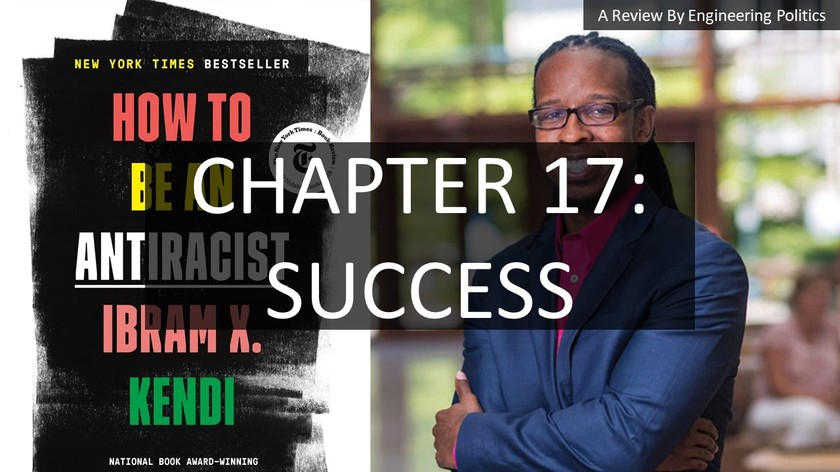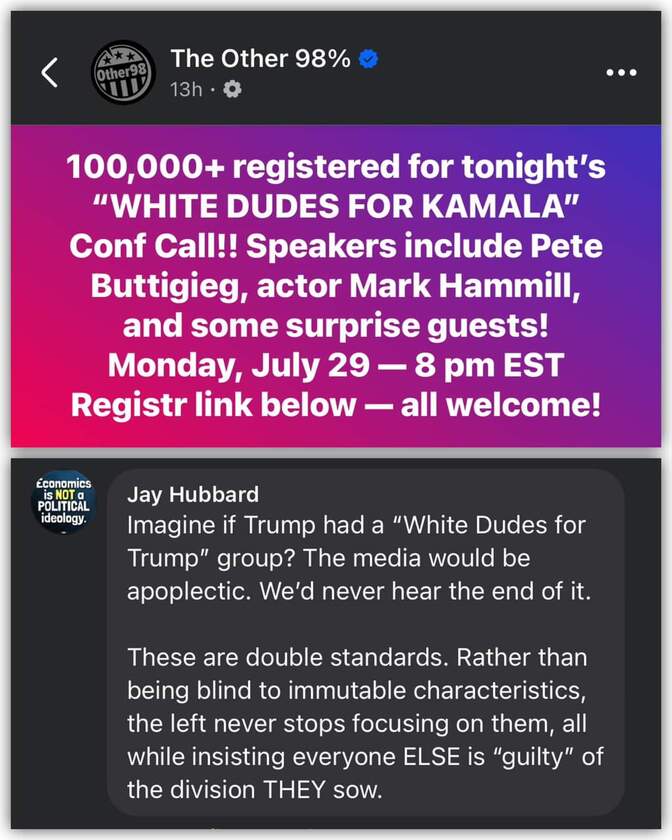
Finally! A chapter with no stupid definitions at the beginning. I’ll save a few brain cells on that. There is a lot in this chapter, but most of it has been covered in other chapters. Kendi ends the chapter with his steps to antiracist salvation which I will get to at the end of this review, but before we get there, come with me on a faith journey of deception and dishonesty as we fill our hearts with hate. Amen.
“Success. The dark road we fear. Where antiracist power and policy predominate. Where equal opportunities and thus outcomes exist between the equal groups. Where people blame policy, not people, for social problems. Where nearly everyone has more than they have today. Where racist power lives on the margins, like antiracist power does today. Where antiracist ideas are common sense, like racist ideas are today.”
Kendi describes his antiracist utopia that really does sound like a pleasant place. All utopias do, but it is not about what utopia looks like as much as it is a question of how you get there. “Where equal opportunities and thus outcomes exist between the equal groups,” makes the assumption that every aspect of every group results in the same outcomes using the same inputs. We know this is not true. Very large, diverse groups are not equal in every way in all contexts. And considering this fact, we know we have a choice between equal opportunity and equal outcome, but we cannot have both unless we completely fix the whole system. And by fix, I do not mean to make better, but to control inputs and outputs. These are ideas antithetical to the founding principles of the United States, but therein lies a key part of Kendi’s argument: Racism is an essential founding principle that allows America to function. He mentions this several times throughout the chapter. Karl Marx had a similar vision of success where “everyone has more than they have today,” which sounds lovely, until you are the person that has too much.
Kendi continues the chapter by bringing up the death of Trayvon Martin and using it as an act of clear racism, and I’m going to stick on this for a bit because of how Kendi uses narrative to change the story of Trayvon Martin into a story of racism in America. Kendi described the catalyst for the incident as, “[t]he Black body’s presence, a crime. The historic crime of racist ideas.” Kendi conveniently leaves out several important details in order to forward his narrative.
“Trayvon had just been suspended for carrying a bag with a trace of marijuana at his Miami high school. While suburban White teenage boys partied and drank and drove and smoked and snorted and assaulted to a chorus of ‘boys will be boys,’ urban Black boys faced zero tolerance in a police state.”
Kendi paints a picture of Trayvon as an upstanding young man who was just suspended one time because of a little weed. Kendi conveniently leaves out that, according to a report obtained by the Miami Herald, this was the third time he was suspended from school that year. Other offenses included getting caught for spraying graffiti. He was also caught with 12 pieces of women’s jewelry that he claimed wasn’t his, but the police found no evidence they were stolen, so he wasn’t charged. That doesn’t seem like something the racist institution of police would normally do, right? Kendi also cites no evidence to back up his claim that white teenagers where living lives like 80’s drug lords while black teenagers were getting arrested for any and all small offenses.
“The watch-group organizer [George Zimmerman] was born a year after me, to a White Vietnam veteran and a Peruvian immigrant.”
Kendi had to establish that George Zimmerman was white, or at least part white, as an important detail to his race narrative.
“[Zimmerman’s] assault conviction and domestic-violence accusations altered his plans to be a police officer. But nothing his conviction that the Black body – and not his own – was the criminal in his midst.”
George Zimmerman was arrested for resisting an officer in 2005 but was never convicted because the charges were dropped when he agreed to enter an alcohol education program. Domestic violence charges from his former fiancé were also dropped, so Zimmerman was not convicted of anything. More importantly, to claim the primary motivating factor here was race is just plain disgusting. Even the Obama DOJ did not find racism to be a motivating factor for Martin’s death after an investigation in 2013. But he ignores all of this to forward a false narrative.
“Martin ran. Zimmerman leapt out of his car in pursuit, gun at his waist, phone in hand. The [police] dispatcher told him to stop. Zimmerman ended the call and caught up to Martin, a dozen or so minutes after 7:00 P.M. Only one person living knows exactly what happened next: Zimmerman, probably fighting to ‘apprehend’ the ‘criminal.’ Martin probably fighting off the actual criminal for his life.”
According to medical reports, Zimmerman was beaten before he shot Martin that resulted in a broken nose, two black eyes, and two lacerations to the back of his head. The media tried to say Zimmerman was unharmed and even went as far as to edit the dispatcher call transcript to make him seem racist – NBC had to later issue an apology. There is more evidence than just Zimmerman’s word.
“Claiming self-defense to save his own life. A jury agreeing, on July 13th, 2013.”
Kendi stops it there as if this was some injustice that Zimmerman was acquitted of all charges that included murder in the second degree. No matter what you think about George Zimmerman and his conduct, we should not try to increase the severity of a criminal charge just for political reasons, but that is exactly what Special Prosecutor Angela Corey did in this case. A wide consensus of legal experts agree that the case was overcharged and doomed from the start. Manslaughter would have been a more appropriate charge from the beginning. But Kendi uses this to say the justice system is just as racist as the police.
“It happens for me in successive steps, these steps to be an antiracist.”
“I stop using the ‘I’m not a racist’ or ‘I can’t be racist’ defense of denial.”
“I admit the definition of racist (someone who is supporting racist policies or expressing racist ideas).”
“I confess the racist policies I support and racist ideas I express.”
“I accept their source (my upbringing inside a nation making us racist).”
“I acknowledge the definition of antiracist (someone who is supporting antiracist policies or expressing antiracist ideas).”
“I struggle for antiracist power and policy spaces. (Seizing a policymaking position. Joining an antiracist organization or protest. Publicly donating my time or privately donating my funds to antiracist policymakers, organizers, and protests fixated on changing power and policy).”
“I struggle to remain at the antiracist intersections where racism is mixed with other bigotries (Eliminating racial distinctions in biology and behavior. Equalizing racial distinctions in ethnicities, bodies, cultures, colors, classes, spaces, genders, and sexualities.)”
“I struggle to think with antiracist ideas. (Seeing racist policy in racial inequity. Leveling group differences. Not being fooled into generalizing individual negativity. Not being fooled by misleading statistics or theories that blame people for racial inequity.)”
Kendi finally lays out his step-by-step process of antiracist indoctrination. He starts out by changing language to fit the narrative he has in his head. He then confesses his sins to show his willingness to sacrifice. The next step is to blame those sins on a “nation making us racist” which is his leap of faith. The language then changes as a call to action using a struggle activating the antiracist convictions that lead to the seizing of policymaking positions as if they are positions to take rather than campaign for and be elected to via our democratic functions of government. This language is important because these antiracist organizations and protests (mostly peaceful I hear) use coercion to force people to believe in their ideology rather than changing minds which, according to Kendi, is not a critical part of activism per the previous chapter. Donate your time and money to “policymakers, organizers, and protests fixated on changing power and policy.” He uses the word fixated very purposefully here because it perfectly describes his obsession with power and policy. As his next step explicitly states, behavior should be ignored during this antiracist awakening. Individual agency is secondary, or really not considered at all, when fighting inequities because we have a system to blame. Kendi carefully places biology next to behavior in order to say if you blame behavior, you must be a racist. He allows no room to separate the two while also doubling down on this idea by “equalizing racial distinctions in culture,” to shut off the possibility that culture, which is indirectly influenced by race via tribalist tendencies, influences behavior in any way. If he even leaves a little space to allow culture to be seen as part of the problem, his ideology falls apart. His final step is to accept antiracism in your hearts and minds. “See racist policy in racial inequity,” or in other words, find the racism in every disparity. “Level group differences,” or in other words, ignore group differences because they are not important, and you would be racist to believe otherwise. “Do not be fooled by misleading statistics or theories that blame people for racial inequity,” or in other words, do not blame people for their individual actions because the veil of racism covering their heads is why people act the way they act.
The church of antiracism has its own holy trinity that includes oppression, power, and policy that are all part of one central affirmation of critical race theory. Become a believer and you will be saved.
Thanks for reading my rant style review of the seventeenth chapter of How to be an Antiracist by Ibram X. Kendi. Please let me know if you find this useful. My goal here is to explain each chapter enough and in a somewhat objective way so others don’t waste their time and money on investigating this material themselves. I know this kind of goes against the logic of investigation where you want to read the source material yourself and build your own conclusions, but this is a very shallow read that does not strain the mind, in any positive way at least, like any proper academic book should. Please leave a comment with your thoughts.
Thanks for being a part of the Engineering Politics Locals Community!

I was listening to some news updates when I heard this CNN clip about the potentially hazardous water in East Palestine, and as soon as I heard her ask the question about whether or not her guest would drink the water, I IMMEDIATELY thought of this clip from South Park. Enjoy.
In this special episode of The Engineering Politics Podcast, Truman from Return To Reason is back for a new video and podcast series titled ‘Revisiting The Road To Serfdom’ where we review F.A. Hayek’s classic work, The Road To Serfdom. This episode covers ‘Chapter 15: The Prospects of International Order’.
This will be an ongoing series that covers the entire book. We put a ton of work into making this insightful and relevant, so we hope you enjoy watching/listening as much as we enjoyed reading and recording.
Become a subscriber of the Engineering Politics Locals Community to support this content. Also, consider joining the @ReturnToReason Locals Community to show Truman some support.
In this episode of The Engineering Politics Podcast, I team up with Truman from @ReturnToReason to interview one of the most intelligent and influential creators in the space of philosophy today. Stephen R.C. Hicks is a Professor of Philosophy at Rockford University, Executive Director of the Center for Ethics and Entrepreneurship, and Senior Scholar at The Atlas Society. He has written many books including Explaining Postmodernism and Nietzsche and the Nazis. We bring him on to talk about the social and political issues we are currently facing in America, and the West more broadly, and what the collectivist ideas of Jean-Jacques Rousseau might have to do with it.
Become a subscriber of the Engineering Politics Locals Community to support this content. Also, consider joining the @ReturnToReason Locals Community to show Truman some support.
In this special episode of The Engineering Politics Podcast, Truman from Return To Reason is back for a new video and podcast series titled ‘Revisiting The Road To Serfdom’ where we review F.A. Hayek’s classic work, The Road To Serfdom. This episode covers ‘Chapter 15: The Prospects of International Order’.
This will be an ongoing series that covers the entire book. We put a ton of work into making this insightful and relevant, so we hope you enjoy watching/listening as much as we enjoyed reading and recording.
Become a subscriber of the Engineering Politics Locals Community to support this content. Also, consider joining the @ReturnToReason Locals Community to show Truman some support.
In this episode of The Engineering Politics Podcast, I team up with Truman from @ReturnToReason to interview one of the most intelligent and influential creators in the space of philosophy today. Stephen R.C. Hicks is a Professor of Philosophy at Rockford University, Executive Director of the Center for Ethics and Entrepreneurship, and Senior Scholar at The Atlas Society. He has written many books including Explaining Postmodernism and Nietzsche and the Nazis. We bring him on to talk about the social and political issues we are currently facing in America, and the West more broadly, and what the collectivist ideas of Jean-Jacques Rousseau might have to do with it.
Become a subscriber of the Engineering Politics Locals Community to support this content. Also, consider joining the @ReturnToReason Locals Community to show Truman some support.
In this special episode of The Engineering Politics Podcast, Truman from @ReturnToReason is back for a new video and podcast series titled ‘Revisiting The Road To Serfdom’ where we review F.A. Hayek’s classic work, The Road To Serfdom. This episode covers ‘Chapter 14: Material Conditions and Ideal Ends’.
This will be an ongoing series that covers the entire book. We put a ton of work into making this insightful and relevant, so we hope you enjoy watching/listening as much as we enjoyed reading and recording.
Become a subscriber of the Engineering Politics Locals Community to support this content. Also, consider joining the @ReturnToReason Locals Community to show Truman some support.














